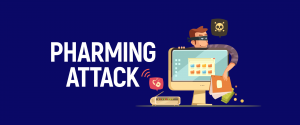

Get 93% OFF on Lifetime
Exclusive Deal
Don’t miss out this deal, it comes with Password Manager FREE of cost.
Get 93% off on FastestVPN and avail PassHulk Password Manager FREE
Get This Deal Now!By Nick Anderson No Comments 5 minutes
Security on the internet is not a luxury, but something you, as a user, must always strive for. We use our blog to educate you on security and privacy and how you can protect yourself online. Various vulnerabilities exist; there are several ways through which attackers can target you.

Some techniques are more dangerous than others, which brings us to Pharming. As we’ll explain in our blog, Pharming is especially dangerous because it evades us. A little recap on how the internet works are in order to get a good grip on this attack fully.
The internet is a vast network of computers. These computers are either clients or servers (also known as hosts). The servers host websites that clients interact with. All devices on the internet have an IP address that serves as a unique identifier. Your device has an IP address, and this blog has an IP address; the two establish a connection with each other knowing this 32-bit (IPV4) or 128-bit (IPV6) address.
But memorizing a string of numbers, and especially for dozens of websites, lands us inconvenience. Hence, we invoke addresses through alphanumeric names, such as fastestvpn.com, instead of its underlying IP address.
With so many websites and the corresponding IP addresses, the need for DNS servers arose. DNS servers are phonebooks of the internet that include addresses of websites.
Whenever you make a request to visit fastestvpn.com, the request travels through your ISP’s server that then uses a DNS server to look up the address and fetches the relevant webpage back to you.
In a Pharming attack, the attacker infiltrates a DNS server to route requests to a different destination. The attacker can take you to any website it wishes in order to carry out malicious intent. If you wanted to visit Facebook, it could route you to a different website to display ads or lure you into downloading a malicious file.
What’s even more frantic is the fact that the attacker can show you fake login pages. So instead of returning the real Facebook, you could be shown a forged Facebook page. The login fields will act as a proxy for the attacker to gain your credentials. Now replace Facebook with your bank’s online login page, and we can see what makes it so dangerous.
Pharming succeeds because it evades our attention. Common phishing attempts try to lure you into clicking on URLs or downloading a program, whereas Pharming diverts unsuspecting users to fraudulent or malicious web pages. It’s like someone changing contact detail in your phone without your notice so that you end up connecting to someone else when you dial.
It’s like Phishing but not quite like it at the same time. It’s easy to spot a phishing attempt, but someone in a hurry may not double-check the URL that’s returned, thus leading to a successful Pharming attack.
In addition to DNS poisoning, a malicious program on your computer can alter proper functionality. By modifying the host files that sit securely in your Operating System, the attacker can divert you to a different website whenever your web browser generates a request.
So, there are two ways Pharming can be carried out: one is by poisoning DNS servers, and the other is by infecting the client’s system. We talked about how Pharming can evade notice. It’s because you are unlikely to become suspicious of a URL that you type.
Now that you know of another exploit that exists, it’s time to prepare yourself. Follow these steps for protection against Pharming:
The steps explained don’t just serve as protection against Pharming but also readies you for a safe web browsing experience. Public or Free Wi-Fi networks are most vulnerable to attacks, and a VPN can keep your data safe by encryption communication.
© Copyright 2024 Fastest VPN - All Rights Reserved.


Don’t miss out this deal, it comes with Password Manager FREE of cost.
This website uses cookies so that we can provide you with the best user experience possible. Cookie information is stored in your browser and performs functions such as recognising you when you return to our website and helping our team to understand which sections of the website you find most interesting and useful.
Strictly Necessary Cookie should be enabled at all times so that we can save your preferences for cookie settings.
If you disable this cookie, we will not be able to save your preferences. This means that every time you visit this website you will need to enable or disable cookies again.


